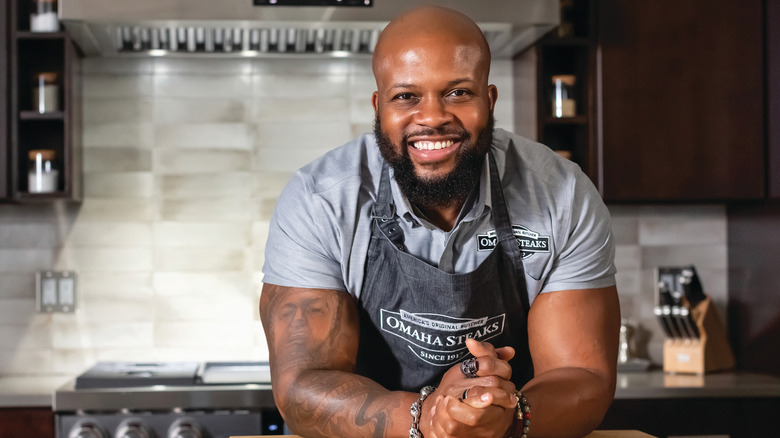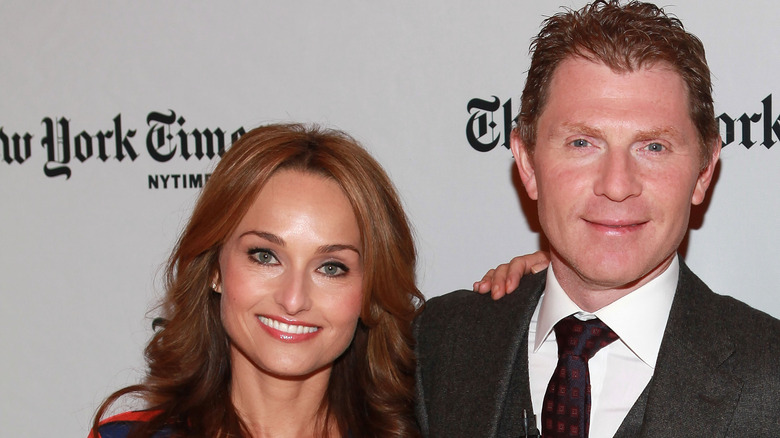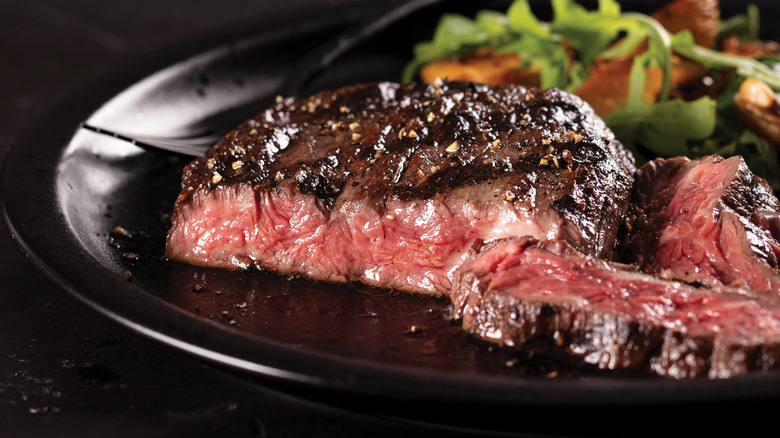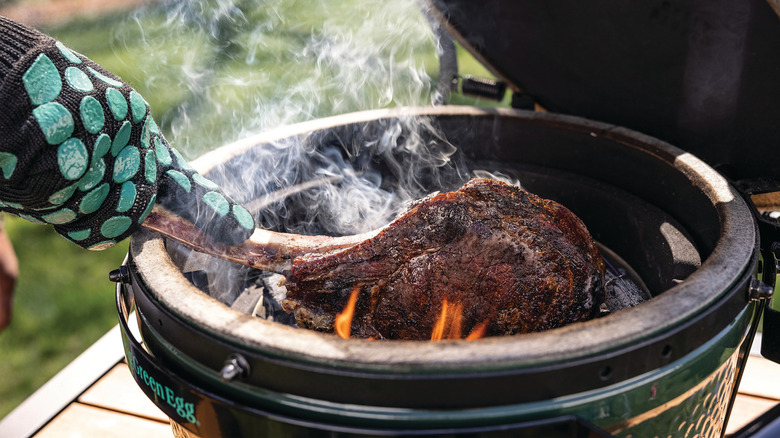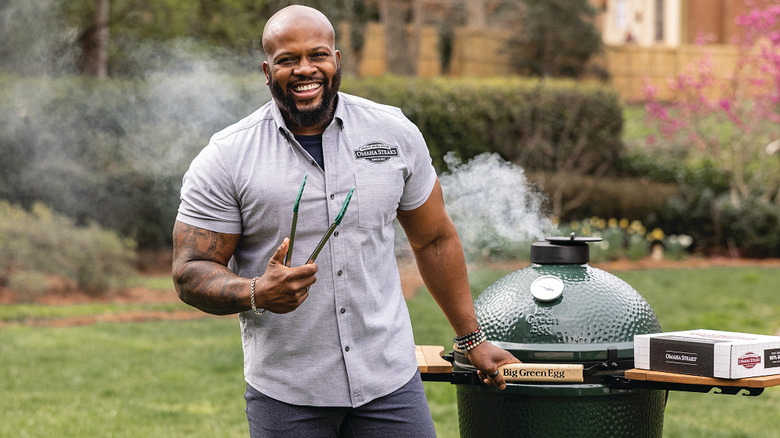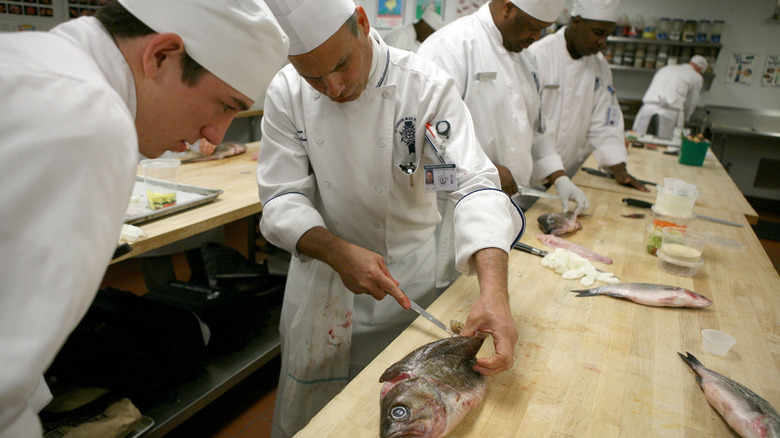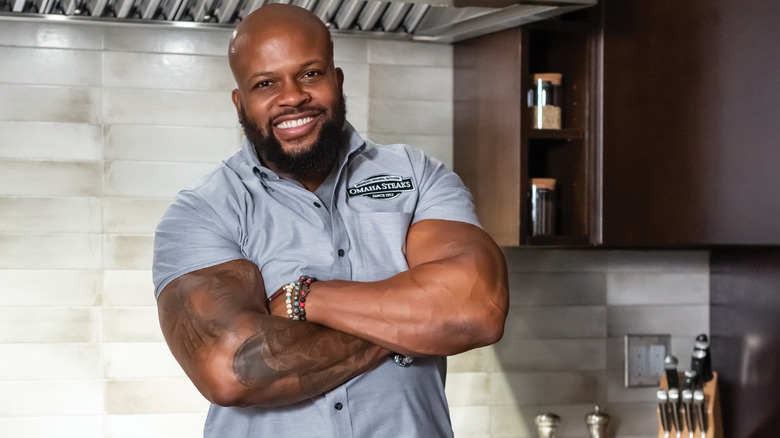Chef David Rose Talks Grilling, Steaks, And Food Network Star - Exclusive Interview
One of the most charismatic and personable contestants who competed for the title of "Food Network Star" is Chef David Rose. He appeared in the 13th season of the show and earned lavish praise from Giada De Laurentiis. In episode 6, Rose was pitted against Bobby Flay, and although Rose was confident he had won the round, he was eliminated from the show. Rose hardly faded into obscurity though, and instead was deluged with career opportunities. Since "Food Network Star," Rose has made frequent appearances on other Food Network shows, "Good Morning America," "The Today Show," and many others.
Today, he's the brand ambassador for Nissan USA and Big Green Egg, and recently he became the Executive Chef and Spokesperson for Omaha Steaks. Rose took time off from his busy schedule to talk with us in an exclusive interview about his culinary background (he's a graduate of the prestigious Le Cordon Bleu culinary academy), his unique passion for ribeye steaks, and tips and techniques for how you can become a grill master. Obviously, we couldn't resist asking him about his journey on "Food Network Star."
David Rose reveals what Food Network Star is really like
Tell us all about "Food Network Star."
It was great, man. It was truly a once-in-a-lifetime experience where I treasure the moments, I treasure the challenges, and I treasure the friends I made. I competed on season 13 of "Food Network Star." So for those who aren't familiar with the premise of "Food Network Star," it's a show where professional cooks, home cooks, and food bloggers come together and compete for their own TV show on Food Network. But it was just really crazy out there where you're looking at these shows on TV and you're just staring at yourself, "Hmm, I could do that." Then you're actually in the thick of it, and it's just the most crazy, random challenges, where they say you got to make a four to five-course meal, you have to use chocolate, a Slim Jim, saltines, and you have 10 minutes, and you're like, "What? What do you do with that?"
So I thoroughly enjoyed my experience, out of 13 finalists I made it to lucky number six, and the way I was eliminated ... If I could be eliminated, I wouldn't have picked a cooler way to be eliminated. I was cooking head to head with Bobby Fla,y and I lost to Bobby. So if I'm going out, I'm going out in a blaze of glory. And I went toe-to-toe with the Iron Chef, so that's pretty cool. So I cherish the memories, but would I do it again? Probably not.
What were you cooking in the competition with Bobby?
It was a "Beat Bobby Flay"-themed episode. So I've been here in Atlanta for a very long time, since '03. So at that point in time, 15, 14 years, and Bobby asked, "David, what do you want to make?" And I've made shrimp and grits about a thousand times and tasted it probably 10,000 times. So I said, very confidently, "You know what, Bobby? Shrimp and grits."
So we're going head-to-head, side-by-side, Bobby's over here, I'm over here. And he's like, "Hey Dave, can I try your sauce?" I'm like, "No, Bobby, you can not." That's what I was thinking, but world-class chefs like Bobby, you let Bobby taste your sauce. So Bobby tastes my sauce, he's like, "Wow, that's pretty good." I try his, he's like, "How is it?" I'm like, "Meh, it's okay."
So I think I have it in the bag, because as far as flavor, I think I'm edging him out just a little bit. So I'm hanging out there waiting for the feedback from the judges overall, my feedback sounded better. So I'm thinking to myself, I live to fight and cook another week, and they're reading out the names of who was eliminated, and I'm there just chilling. And to my surprise, they said, "David Rose, you got to go."
But I would not trade it for the world, I learned so much from Bobby. It was a great experience. And by me losing that was the biggest blessing because so many opportunities have opened up since then, where I've done "GMA," "Today Show," work with several brands and it brought me all those choices, all those decisions ... and I am the executive chef of Omaha Steaks. So in that regards, I really won, I'm the winner.
Did you ever find out why Bobby's sauce beat yours?
No, it was something I think I might've put microgreen salad on there, with the dressing. So I think it, might've just been a little bit of editing on my part where I could have easily omitted that one ingredient, but, everything happens for a reason. But if you see Bobby tell him I'm looking for my rematch because I need my revenge, and I can finally close that "Food Network Star" [chapter].
Maybe Bobby will read this and respond?
If you see, Bobby, I'm coming for you, Bobby, rematch.
What was it like working with Giada?
Giada was great. She's a well of information, very polished, great on-screen persona, and a great coach. So both Bobby and Giada are really amazing, [I] couldn't have asked for two better coaches.
Anything you would have done differently?
The shrimp and grits dish I would have left off one less thing that I probably might've went further. But I have no regrets because I really went out there, and I was myself on camera, off camera, so I really have no regrets in that regards. Except for that one additional ingredient, I might've left that out, besides that, aces.
David Rose's method for grilling the best steak
Tell us about your role as Executive Chef at Omaha Steaks.
As Executive Chef and spokesperson for Omaha Steaks, I am responsible for making amazing, great new, and flavorful recipes whether it be new products or standby products, or holiday specials and recipes. And it is my job to think and be very creative and thoughtful when it comes to the creation process and best highlighting the immense delicious portfolio, which is Omaha Steaks. And that includes social media, commercials, website content, everything.
What's your absolute favorite product at Omaha Steaks?
We have a 48-ounce bone-in ribeye. And ribeye, if I could marry a steak or an inanimate object, a ribeye would be that. And it's just the quintessential perfect cut of meat. It's a thing of beauty.
How do you advise cooking that big steak?
There's a couple of different ways to go about it. You can do the sous vide method where you're going low and slow essentially, where you have the steak at about five to 10 degrees lower than your target temperature set. So say for me, I love a medium rare ribeye, so I want to go for about 130 F cooking temperature. So what I do, if I'm doing the sous vide method, is I would set the water bath temperature for 120 F, 125 F, and then I let that go for about two hours until the internal temperature of the ribeye reads that.
So from there at that point, the rib eye is pretty much cooked. I just go ahead, I rip up the grill, get it nice and hot and get that nice, hard crusty char on the steak. You can also do the reverse sear method, where you can start it out on the grill at about 250 F, and again you want to slowly bring it up to that temperature. After that, you'd take it off the grill, amp it up to 500 F, 550 F to direct heat and then you sear it. So there's a million ways to cook a steak. Like there's a million ways to skin a cat. And it's delicious, and it tastes good, and it's cooked to perfection. That's what matters most.
This is how to avoid overcooking steak, according to David Rose
What are your tips for first-time grillers for not overcooking a steak?
Yes, we here at Omaha Steaks, we like to give you the tools that are necessary for success, and we want to see you become a grill champion. So we have cooking charts with all of our proteins and steaks we sent out. So what we recommend for getting tools-wise is a timer and also a digital thermometer. Because the last thing you want to do when you're juggling eight, 10 steaks, and the kids are screaming, the guests are screaming, grandma's getting hangry, is you don't want to guess what temperatures which steak and forget which steak is which steak.
So by getting the digital thermometer, it takes all of the guesswork out of that. With burgers, you want to flip it once and only once. Too many times you go to a barbecue that's flipping the burger two, three, four, five, six times. Stop doing that, flip it once. By flipping it once you're allowing that nice sear, that nice caramelization, that nice crispy, crusty exterior to develop, but also imparting that juiciness and moisture to stay in the burger where it belongs. So flip it once, resist the temptation to press down on the spatula, let the burger do its thing. Flavor takes time to develop, so those juices belong in your stomach, not on the bottom of the grill, which would probably happen if you use the spatula. So you follow those two rules, you'll be a king at any barbecue, and you'd be the grill master.
Some people have concerns about foodborne bacteria in cooking a rare steak or burger. Is the bacteria killed at medium-rare?
Oh, for the most part. It depends really on what you're cooking. Steaks, what you want to do definitely is always before the steak even hits the grill is you want to take it out and only leave it out for about 10 to 15 minutes to come to room temperature. You never want to have steak or any kind of meat outside in the sun, exposed to ... long times of exposure to heat or sun or humidity, you definitely don't want that. So that's very important, when taking it out from the fridge and timing that appropriately.
But as far as the steaks, we do have high quality and naturally aged steaks, your Omaha Steaks, so when you thaw ... oh, that is a really great time. Once you thaw and bring it to room temperature to put it on the grill, and you should be okay. You should be all right.
David Rose prefers the caveman method for cooking steak
It's obvious you love your Big Green Egg. I'm guessing you prefer charcoal over propane gas?
Yes, sir. I am a charcoal man through and through. Charcoal runs through my veins. There's a certain flavor profile that having charcoal and smoke that adds to smoked meats and smoked poultry and smoked seafood. Whether you have mesquite wood chips you can use, you can use apple, you could use cherry, you could use a whole plethora and just kind of impart that flavor. And for me, the caveman had it right all those years ago, meats onto the charcoal onto the wood over that. And one of my favorite methods of finishing off a steak, you can only do with charcoal, it's called the caveman method, where you do either reverse sear or sous vide and get that nice, hard sear directly right onto the coals and that can only be done with the charcoal grill.
How should people set up the charcoal in their grill? Hot areas and cool areas, is that right?
Definitely. You want to have the grill cranked up, so about 550 F, 600 F, depending on what type of charcoal grill you have. But you want to put that steak on the hottest part on the coals. So, something that's toasty and red, cherry-red embers, that's a good indicative sign visually, a visual cue of the hottest part of the charcoals. That's where you want to put that steak.
Is there a cooling area in the grill we should set up? Not as a hot area?
No, definitely. When you're trying to finish off the steak and get that nice, hard sear you want to put it into the hottest part of the coals, for the caveman, yes.
David Rose was working the grill at a young age
Tell us about your fascinating family background.
So I come from a huge family. I'm one of eight, mom's one of 13, dad's one of nine. And out of eight kids, I'm the only one born in America, everybody else was born in Jamaica. And then my mom's siblings have five, six kids, and so on and so forth. So I've always been around great food, whether it be backyard barbecues, where it's 80 to a hundred people or following my parents to work, where my mother was a chef at a nursing home, and my dad was a chef at a monastery for nuns. So food has always been my life. I tell the story all the time, my very first experience with grilling, I was 6 years old, dad was making grilled jerk chicken, and he said, "Don't burn the chicken," handed me the tongs, and walked away. So when I say grilling and food and meat is my life, it literally is my life.
What's your favorite thing to cook?
Grilling was my favorite thing to do amongst family, and these barbecue gatherings really resonate because it reminds me of family and going back to Jamaica, just driving up and down the street where you see these huge steel drums where smoke is just permeated with that really sweet aroma and perfume of pimento wood smoking, jerk chicken. So jerk chicken is something I probably enjoy eating the most and cooking the most because it reminds me of my years growing up as a youth, visiting Jamaica, my family's home country. So jerk chicken. Love it.
What was your experience attending Le Cordon Bleu?
I graduated class of 2006. And prior to that, the words David Rose and academia really didn't come together in the same sentence. But something about culinary school, it just really piqued my interest, something I gravitated towards. And I finished summa cum laude, top of my class, so [it was a] very proud achievement that day when I graduated. So I love food, food loves me, and I couldn't think of a better role to have than at the helm as executive chef for Omaha Steaks.
David Rose's advice for first-time grillers
What advice can you give to a first-time griller?
First things first, before you even light the grill up, make sure the grill is always clean. A clean grill is a happy grill. So you want to make sure, either before or right after, use a non-bristle grill brush, get rid of all that grit, all that grime, all that old baked on, grilled on food. And you want to use a high smoke point oil, like canola oil or vegetable oil, or grapeseed oil. That's going to provide a nice release for the meat, and you want to stay away from these two biggest mistakes you can possibly do when you're grilling: overcooking and flipping the steak too much.
Do not overcook the steak, get you a timer and a digital thermometer so you know exactly what that temperature is. And when you have the burgers flip it once and only once. That's going to keep it nice and charred and seared with a beautiful juicy center. And whatever you can, as tempting as it sounds, refrain from pressing down and pressing out all the juices in the burgers. So it keeps it juicy and flavorful and tender. Let the burger do its thing. So those two tips right there will get you everything you need to do every single time.
You can find more of David Rose's tricks and tips for grilling over at Omaha Steaks and follow his culinary adventures on his Instagram page.
